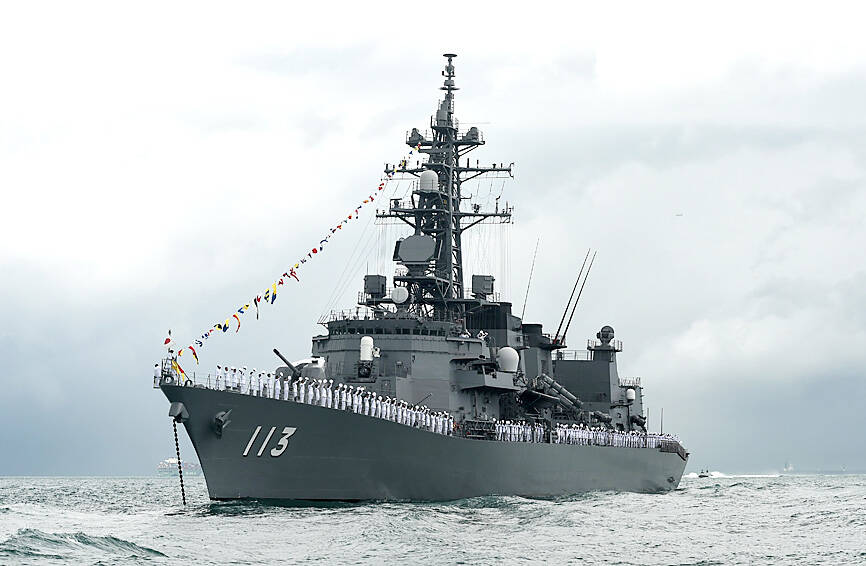The Philippine and Japanese navies yesterday held their first joint exercise in the South China Sea, as the two US allies boost security ties in the face of China’s growing pressure.
The drills followed the signing less than a month ago of an agreement between Manila and Tokyo to allow the deployment of troops on each other’s territory.
The Japanese destroyer JS Sazanami and the Philippine guided missile frigate BRP Jose Rizal took part in the two nations’ first bilateral “Maritime Cooperative Activity,” the Philippine military said in a statement.

Photo: AFP
“This activity was part of the ongoing efforts to strengthen regional and international cooperation towards realizing a free and open Indo-Pacific,” the statement said.
The two vessels held a communications exercise and undertook tactical maneuvers in the West Philippine Sea, Manila’s name for parts of the South China Sea that are closest to its coast.
These “enhanced the tactical capabilities of the Philippine Navy and the Japan Maritime Self-Defense Force and reinforced the strong ties and mutual commitment to maintaining peace and stability in the region,” the statement added.
A similar exercise was held two days earlier, also in South China Sea waters close to the Philippines, between the Philippine navy patrol ship BRP Ramon Alcaraz and the US Navy’s littoral combat ship USS Mobile.
The Philippines and Japan are longtime allies of the US, which has been strengthening its alliances from Canberra to Tokyo to counter China’s growing military might and influence in the region.
The deepening of Philippine-Japanese security ties comes as China’s saber rattling toward Taiwan and over the South China Sea fuels fears of a potential conflict that could drag in the US.
There have been escalating confrontations at sea between Chinese and Philippine vessels as Beijing steps up its efforts to push its claims to nearly all of the strategic South China Sea.

PREPAREDNESS: Given the difficulty of importing ammunition during wartime, the Ministry of National Defense said it would prioritize ‘coproduction’ partnerships A newly formed unit of the Marine Corps tasked with land-based security operations has recently replaced its aging, domestically produced rifles with more advanced, US-made M4A1 rifles, a source said yesterday. The unnamed source familiar with the matter said the First Security Battalion of the Marine Corps’ Air Defense and Base Guard Group has replaced its older T65K2 rifles, which have been in service since the late 1980s, with the newly received M4A1s. The source did not say exactly when the upgrade took place or how many M4A1s were issued to the battalion. The confirmation came after Chinese-language media reported

A Ministry of Foreign Affairs official yesterday said that a delegation that visited China for an APEC meeting did not receive any kind of treatment that downgraded Taiwan’s sovereignty. Department of International Organizations Director-General Jonathan Sun (孫儉元) said that he and a group of ministry officials visited Shenzhen, China, to attend the APEC Informal Senior Officials’ Meeting last month. The trip went “smoothly and safely” for all Taiwanese delegates, as the Chinese side arranged the trip in accordance with long-standing practices, Sun said at the ministry’s weekly briefing. The Taiwanese group did not encounter any political suppression, he said. Sun made the remarks when

The Taiwanese passport ranked 33rd in a global listing of passports by convenience this month, rising three places from last month’s ranking, but matching its position in January last year. The Henley Passport Index, an international ranking of passports by the number of designations its holder can travel to without a visa, showed that the Taiwan passport enables holders to travel to 139 countries and territories without a visa. Singapore’s passport was ranked the most powerful with visa-free access to 192 destinations out of 227, according to the index published on Tuesday by UK-based migration investment consultancy firm Henley and Partners. Japan’s and

BROAD AGREEMENT: The two are nearing a trade deal to reduce Taiwan’s tariff to 15% and a commitment for TSMC to build five more fabs, a ‘New York Times’ report said Taiwan and the US have reached a broad consensus on a trade deal, the Executive Yuan’s Office of Trade Negotiations said yesterday, after a report said that Washington is set to reduce Taiwan’s tariff rate to 15 percent. The New York Times on Monday reported that the two nations are nearing a trade deal to reduce Taiwan’s tariff rate to 15 percent and commit Taiwan Semiconductor Manufacturing Co (TSMC, 台積電) to building at least five more facilities in the US. “The agreement, which has been under negotiation for months, is being legally scrubbed and could be announced this month,” the paper said,